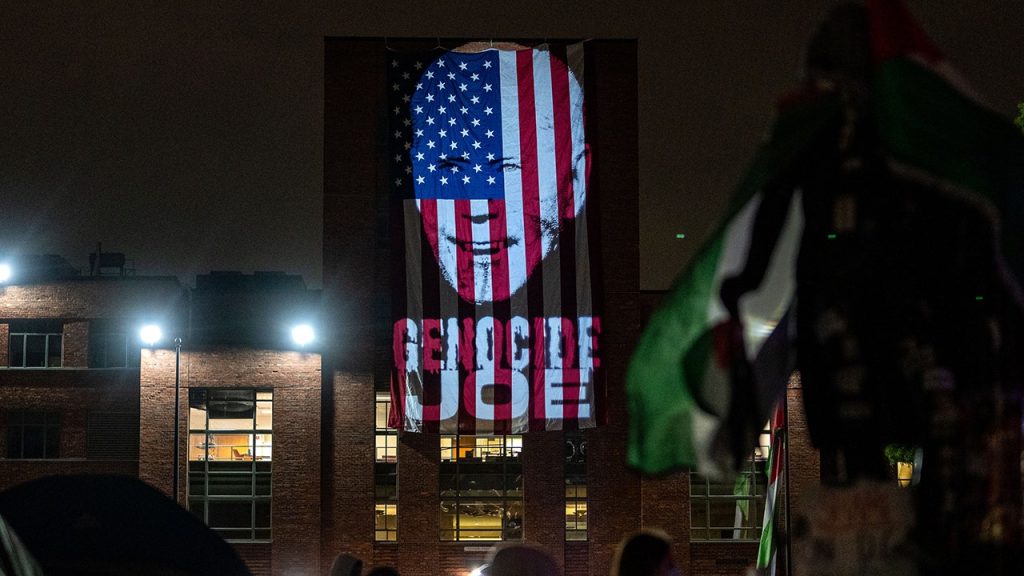A group of anti-Israel protesters at George Washington University in Washington, D.C. have set up an encampment on campus for 13 days, displaying Palestinian flags and defacing a statue of the campus’s namesake, former President George Washington, with Palestinian iconography. The protesters are demanding that the university divest from companies trading with Israel and reveal all investment information to students. They are now urging administrators not to call the Metropolitan Police Department to clear their encampment, expressing their peaceful intentions and organization within the encampment.
The protesters have vowed not to disperse until their demands are met, insisting they will not leave unless the university complies fully. Student organizer Reem Lababdi emphasized the peaceful nature of their activities within the encampment, which include studying, political education, and religious services, and urged against police engagement. However, senior Skyler Sieradzky, who participated in a counterprotest holding an Israeli flag, reported harassment and spitting from the anti-Israel protesters. University President Ellen Granberg declared the ongoing encampment as unlawful and potentially dangerous, calling for support from the MPD to provide security assistance on and around the campus.
The House Committee on Oversight and Accountability Chairman James Comer has announced a full committee hearing titled “Oversight of D.C.’s Response to Unlawful Activity and Antisemitism” to examine the response of university and city leaders to the anti-Israel demonstration. The committee has invited DC Mayor Muriel Bowser and MPD Chief Pamela Smith to testify on the reports indicating MPD’s rejection of GWU’s request for help in removing the protesters. Chairman Comer expressed deep concern over MPD’s refusal to assist GWU in protecting the Jewish student body, labeling it as disturbing and unacceptable. The hearing is scheduled for Wednesday, May 8 at 1 p.m.
Amidst the calls for police intervention and concerns over the safety and legality of the encampment, the protesters have remained steadfast in their demands for divestment from Israeli trading companies and transparency in investment information. The protesters have faced opposition from counterprotesters like Sieradzky, who have been subject to harassment and aggression, adding tension to the campus environment. University President Granberg has reiterated the importance of engaging in critical dialogues within the limits of university policies and district laws, emphasizing the need for peaceful protests that adhere to regulations.
The anti-Israel encampment at George Washington University has sparked controversy and raised questions about the appropriate response to the protests. President Granberg has categorically stated that the demonstration, in its current form, is illegal and potentially dangerous, leading to the university seeking security assistance from the MPD to address the situation. The House Committee on Oversight and Accountability has stepped in to investigate the response of city and university leaders to the encampment, particularly focusing on reports of MPD’s refusal to assist in removing the protesters. The hearing scheduled for May 8 aims to shed light on the ongoing conflict and ensure appropriate actions are taken to protect the interests and safety of all parties involved.
The escalating tensions between the anti-Israel protesters, counterprotesters, university administration, and law enforcement highlight the complex and sensitive nature of the situation at George Washington University. The demands for divestment and transparency in investment decisions reflect the students’ concerns and beliefs, while the concerns raised by President Granberg and Chairman Comer underscore the need for a peaceful resolution. The upcoming hearing will serve as a platform for further discussion and analysis of the events surrounding the encampment, with a focus on upholding the rights and safety of all individuals on campus. Ultimately, the outcome of these discussions and actions taken by relevant authorities will shape the future of the campus environment and the relationships between different groups within the university community.













